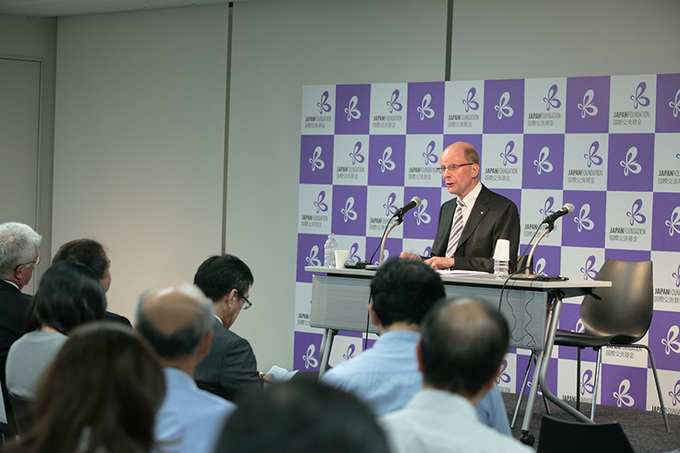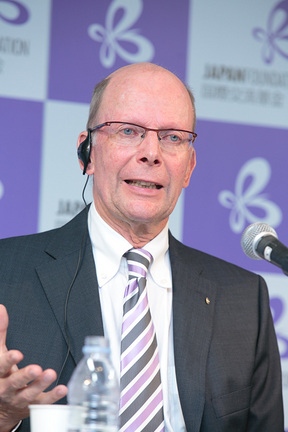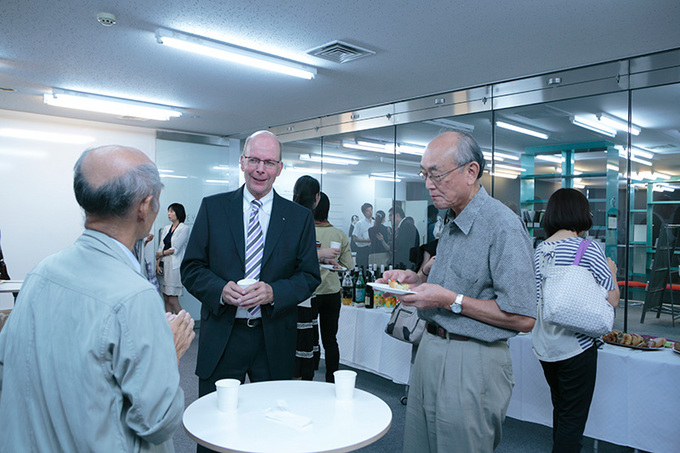Cultural Diplomacy - Opportunities and Limits of Soft Power in Foreign Policy (Part 1)
Kurt-Jürgen Maaß
Honorary Professor of University of Tübingen, Germany
The Japan Foundation held a lecture on opportunities and limits of soft powers in foreign policy. The lecturer Kurt-Jürgen Maaß, former Secretary General (1998 - 2008) of the Institut für Auslandsbeziehungen, one of the leading German institutions for the country's soft power policy, discussed about the topic and introduced the specific cases in Europe.
This article reports the first half of the lecture, followed by the latter part in the next issue.
(The following is a transcript of the lecture at the Japan Foundation JFIC Hall "Sakura" on September 19, 2013.)
My first involvement in cultural exchange
My first personal involvement in foreign cultural policy was in 1958 when my school in Hamburg in Northern Germany organised an exchange of pupils with Birmingham in England. It was the first exchange after World War II. Hitler bombed London, Birmingham and other cities in 1940, and many families lost fathers, mothers, brothers and sisters, and children. Hamburg, where I lived, was 80 % destroyed by British bombing in 1943. Our group of pupils went to school in Birmingham, and later on our English friends came to Hamburg. We, the young people, started a new friendship, and I am even now, after 55 years, still in contact with my English friend John.
My second involvement happened eight years later as a student when I participated in the meetings of young Germans and French in both countries in 1966. This was organised by the Franco-German Youth Office (FGYO), which had been founded in the reconciliation process between France and Germany. I became counsellor and advisor for eight years and met many young people from both countries during the activities such as skiing, sailing, mountain-climbing or just visiting cities or places. For my grandmother, France had been the "hereditary enemy" of Germany for more than a hundred years, and she told me "Yes, you may visit France, but don't come back with a French girlfriend". I did not obey her as far as the girlfriend was concerned... The Franco-German Youth Office (FGYO) is still working today and has exchanged more than 8 million young Germans and French under 300.000 programmes - and none of them have ever understood their forefathers and the hate and hostility against each other.
Post-war German government endeavoured to restore Germany's image after the atrocities of Nazis
It was only later on that I realised that I had been a part of foreign cultural policy and of the initiatives of the German government to improve German image abroad after the atrocities of Hitler's war. The main focus of this policy between 1949 and the mid1970s was to give the world a new image of the democratic Germany and to inform them how my country was dealing with its criminal past during the Nazi regime. It was only after the German Parliament with the help of an "Enquête Commission" making a complete review on its foreign cultural policy that new elements were introduced such as the "two-way street" (not only exporting German culture but also inviting the foreign cultures to Germany) or the convergence of foreign cultural policy and development policy in exchanges. There was also a rising concern in regard to the status and the meaning of the German as a second foreign language in the world and as an official or working language in the international organisations.
Starting in 1977, I was employed at the Alexander von Humboldt Foundation, a specialised agency of the German Foreign Office for foreign cultural policy. I experienced the end of the German Democratic Republic and the fall of the iron curtain in 1989, and I was fascinated with what was happening. During the following years I was able to participate in shaping the new focus of foreign cultural policy in the direction of transformation support in the former USSR states.
When I joined the Institute for Foreign Cultural Relations (ifa) in Stuttgart in 1998, some far-sighted cultural policy makers had already started to promote Euro-Islam dialogue as a new important topic in foreign cultural policy. This development was further fuelled by strengthening the conflict prevention in foreign policy and even stronger after September 11, 2001.
The increased role of culture in foreign policy
With these new topics, the role and the meaning of culture in foreign policy has grown into an unimaginable level over the last decade. And new terminology like "soft power", "public diplomacy" and "cultural diplomacy" came over to us from the United States. Soft power in foreign policy means the use of cultural operations, dialogue and attempts to convince others, in contrast to hard power, the use of military intervention and political power. As a consequence, the discussion in Germany has taken on a new quality and dimension.
In parallel - and this is good news for universities - unimaginable momentum took hold in scientific research and academic teaching: in more than ten disciplines of the humanities and social sciences topics related to foreign cultural policy are addressed and courses are offered to the students at more than 30 German universities.
Three key terms to analyse foreign cultural policy
I would like to systemise and analyse the current foreign cultural policy according to three key terms as follows,
- First, to the approaches for advertisement for Germany and for the goals of German foreign policy,
- Second, to the approaches to support a dialogue on values and ideals and their meaning in foreign policy, and
- Third, to the increased international competition under foreign cultural policy which puts Germany under pressure and calls for new ways of thinking
Why is this interesting for me as a professor of political science? Foreign cultural policy is a part of foreign policy, and political scientists need to be able to describe and analyse the intentions of bilateral and multilateral foreign relations among different nations, the resources, tools and pathways, and the successes and failures that can occur and what is behind them. Political scientists also make an effort to create descriptive terminology and to develop standards and methods for analysis.
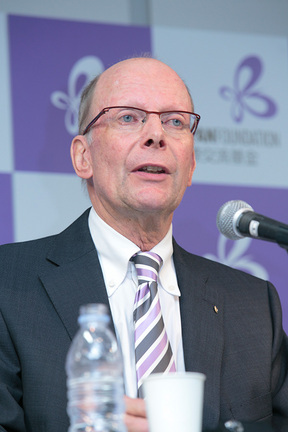 "Advertisement" for the goal of foreign policy
"Advertisement" for the goal of foreign policy
I will start with advertisement. Charles-Maurice de Talleyrand-Périgord, French foreign minister from 1797-1807 and 1814-15, is quoted as having said to his ambassadors abroad: "Faites aimer la France" - see to it that France is loved. The demand doesn't just apply to France; Germany also wants to be "loved", and I am sure that this is also true for Japan. Foreign policy always entails political advertising. Advertisement is made for German interests, German positions, German investments, German exports, as well as for German culture, German science, the German language, and Germany as a location to do business. A look back at the beginning of German foreign cultural policy in the 19th century and in the early 20th century reveals initiatives and topics that could be best described as advertisement - from the German scientific institutions abroad all the way to the German schools abroad, which had early on opened their doors for children from the guest country and for that reason at the beginning of the 20th century were often referred to as "propaganda schools". The propaganda schools didn't only offer a very good education: they also advertised Germany and the German culture (and, by the way, are still doing it today). In 1900 there were more than 400 German schools abroad, in 1914 there were already 900, and after World War I and until 1928 the number climbed to over 1,000. The numbers also speak for the massive German emigration at the time - until 1900 alone nearly 5 million and those responsible for the schools were usually German emigrants. The national school fund (Reichsschulfonds), which financed in part for the dispatch of German teachers to these schools and in 1905 fell under the responsibility of the Foreign Office, can be seen as the beginning of a systematic German foreign cultural policy.
The 1920s saw the establishments of many specialised institutions
Advertisement was the main motive for the many initiatives of the Foreign Office under the direction of Foreign Minister Gustav Stresemann from 1923 to 1929. At that time, everything was geared toward advertisement, asking primarily, "How can Germany's image be restored after the atrocities of World War I?", "How can Germany once again attract foreign students and researchers?", "How can learning German be used to position Germany as a cultivated country again?". In order to make the advertisement more trustable and independent of the respective government, back then independent agencies were established and further developed. All of them are predecessors of the international foreign policy structure that we are familiar with and use today: the German Foreign Institute (today The Institute for Foreign Cultural Relations (ifa)), the Alexander von Humboldt Foundation, the Academic Exchange Service (today The German Academic Exchange Service (DAAD)) the Deutsche Akademie in Munich (which gave rise to the Goethe-Institut), and finally in 1928 the Weltrundfunksender (today Deutsche Welle).
After the period of National Socialism with its fascist propaganda and cultural imperialism, the new approaches of the Foreign Office after 1949 are thoroughly comparable with those from the Weimar Republic era: Using the newly founded independent agencies, a new image of Germany was promoted by all the means and topics that can influence an image in the short, medium and long terms: with German language courses, schools abroad, academic exchange for students and scientists, information and communication via all available media including foreign radio and television, all the way up to nation branding with public relations work, marketing and image campaigns [1].
"Soft power" and "public diplomacy"
This part of foreign cultural policy in the last ten years has received entirely new significance in the public and scientific discussion, triggered by the complete bewilderment of the United States following September 11, 2001 and the catastrophic image of the United States abroad, particularly in the Islamic world. The catchword became public diplomacy and especially in the United States this has led to copious amount of literature, fuelled by the discussion on "soft power", a term that Joseph Nye Jr. coined in the 1990s. Both terms - soft power and public diplomacy - are closely related. Soft power is defined as the ability of a country through its example, attractiveness and moral authority to convince other countries to follow its examples. Joseph Nye said, "Getting others to want the outcomes that you want". Public diplomacy is part of the implementation of soft power and the attempts through international communications to impart the positive aspects of a country, the special meaning of its values and ideals, its culture and its foreign policy into another country. This is done in order to positively influence on public opinion, special groups and non-governmental organisations as well as multipliers and the ruling elite. The assumption is that such an approach changes the image of a country in the target country, and that the public puts pressure on the government to revise a possible hostility or an unfavourable attitude [2]. Nicholas J. Cull, a professor at the University of Southern California, describes public diplomacy as "an actor's attempt to conduct foreign policy by encouraging with foreign public", namely in five different ways: "listening, advocacy, cultural diplomacy, exchange diplomacy and international news broadcasting"[3].
These new methods of advertisement make use of all topics and instruments of traditional foreign cultural policy. They are only successful when they are "tailored" to a country's mid- and long-term foreign policy goals vis-à-vis a certain nation or group of nations. Such goals can be general, such as peacekeeping, political stability and religious tolerance. The goals can also be about fighting against prejudices and stereotypes in certain countries, increasing exports or securing investments. Desired migration (getting the best brains), especially in regard to the national university system, can also be added to the list of goals.
Looking back at Japan's foreign policy
Let me take a look, comparing to Japan. For Japan too, advertising was a key approach after 1945, advertising the new Japan and later on for its successful economic reconstruction. Especially with Asian neighbour countries an additional goal was to fight against hostility to Japan (e.g. through the establishment of extensive youth exchange programs). In the 1980s of the last century overseas image of Japan became the main focus of its foreign policy through cultural exchanges, peace programs and development aid to poorer countries. In addition, Japan started an intensive program for the internationalisation of the Japanese society itself.
In all, it can be said that traditional foreign cultural policy, as well as public relation activities abroad in the framework of public diplomacy, can be assigned to the category of advertisement.
With that, I now come to the second part, namely a dialogue on values. By advertising the goal in regard to foreign cultural policy is to achieve something for one's own nation and one's own interests. A dialogue on values, however, has entirely different goals: concerning the target country, dialogue is intended to contribute to changing the target country.
In the past, Germany has repeatedly put the dialogue on values as the focal point of its foreign cultural policy with other countries: I recall Greece, Spain and Portugal in the 1970s, and in regard to emerging countries pressure to be democratised, allowing freedom of speech and plurality, and introducing more rule of law. After 1990, for more than ten years the absolute focal point of foreign cultural policy was supporting former socialist countries in the Middle and Eastern Europe for their transforming to democracy, market economy and plurality, and with their efforts to attain access to the European Union. Never before had Germany's foreign cultural policy mastered a task as large as this.
In Germany's foreign policy, the experiences after 1990 led to a new and expanded concept of foreign cultural policy of the year 2000. Details include [4]:
- "Foreign cultural policy is an integral part of our foreign policy. It is aligned with and supported by the general goals and interests of Germany's foreign policy - peacekeeping, avoiding conflict, realisation of human rights, cooperative partnership."
- "Our cultural work abroad is not simply neutral, it is oriented on values. It takes a clear stance in the areas of democracy development, realisation of human rights, sustainable growth, participation in scientific and technological progress, poverty eradication and the protection of natural resources."
In 2011, the German Foreign Office formulated even more concretely on the example of the upheavals in the Arab world [5]:
- "We want to help the affected countries embody as workable democracies in a strong civil society. Democracies are not formed overnight nonetheless. Reaching the goal requires great staying power."
So, one main goal of the dialogue on values is transformation support, or very simply stated, the support of change processes toward democracy and a market economy in individual nations.
The increased influence of civil society
The primary target group is the respective civil society in the targeted countries. Civil society has steeped its way into foreign cultural policy over the last two decades. Ten years ago civil society, especially non-governmental organisations, became a bearer of hope for a new international order. Researchers situated civil society between government, family and market, and in the meantime it is considered a key on the way to democracy, rule of law and conflict resolution. In democracies with a functioning system of representation, writes Miriam Egger in her dissertation on foreign activities of German political foundations, civil society organisations have a systemising impact through the aggregation and articulation of societal interests and a structuring impact in an otherwise diffuse landscape of interests. As such, they set the stage for governments, parties and other institutions to be able to jointly take up and process relevant interests [6].
The practical approach of foreign cultural policy is diverse: it operates, for example, via intermediary agencies, political foundations, non-governmental organisations, visitor programmes, presentations, conferences, grants and consultation modules. Dialogue items include topics like basic rights, legal systems, political participation, good governance, formation of trade unions, freedom of the press and the topic of women's standing in society, as well as general topics such as racism, the educational system, scientific systems, economic reforms, combating corruption, environmental protection and conflict resolution structures.
Dialogue with Islamic countries
An important point of dialogue especially with Islamic countries is the extremely underdeveloped regional multilateralism. Today it concentrates on only three organisations: first, the Organisation of the Islamic Conference (a generally ineffective and squabbling union of 54 Islamic countries), second the Arab League (which for the first time made itself visible internationally with its involvement in the internal conflicts in Libya and Syria) and third the Gulf Cooperation Council, which is dominated by Saudi Arabia and as a result is a purely Sunnite organisation. In the West we cannot imagine at all a world without the large and small international organisations of which we are members. Until now their impact on our foreign policy - namely that every country takes on international responsibility and as a result must look far beyond national interests - is very rudimentary in the Islamic world. However, a higher impact would be very desirable, and therefore for a long time this topic has been part of the dialogue on values with these regions.
As an observer of the approaches for dialogue on values in foreign cultural policy, one soon becomes aware that a large part of these tasks cannot be fulfilled at all by national foreign cultural policy approaches. Many of the mentioned topics call for an international consultancy approach, for example via the European Union. Johann Wolfgang von Goethe, Ludwig van Beethoven, Pina Bausch and Gerhard Richter will always remain an original part of the German foreign cultural policy. However, topics such as democracy development, coexistence of religions, dealings with minorities, integration strategies for immigrants, conflict prevention and multilateralism can be brought to the table more convincingly when they are addressed by several countries jointly and under the umbrella of the European Union. Europe stands for enlightenment, belief in progress and tolerance. A proposal to address violent conflicts in a country's own recent past and thereby to initiate possible reconciliation processes is much easier to do from the European Union than from a country like Germany with its own tangled and difficult 20th century history. So far this has not been done by Brussels, but a rethinking is on the way.
Exploring the respective modernisation models
In the future the dialogue on values will be more difficult. The values of Western democracies are no longer a safe bet. On the other hand, this has to do with the fact that many emerging countries have had bad experiences with the modernisation models propagated by the West, and that they are viewed as "auto-destructive and not universally applicable "[7]. Modernisation does not any longer automatically mean "westernisation". Researchers therefore speak of "multiple modernities" and refer, for example, to the Chinese model [8] or the Turkish model [9]. On the other hand radical Islamism is increasingly curbing dialogue opportunities in Western foreign cultural policy. This was quite apparent in the recent elections in Egypt and Tunisia. Nonetheless, in 2012 alone the German Federal Government made €50 million available to support transformation partnerships with Arabian countries [10], in my opinion this is an amazing sum. I look forward to an assessment. (To be continued to "part 2".)
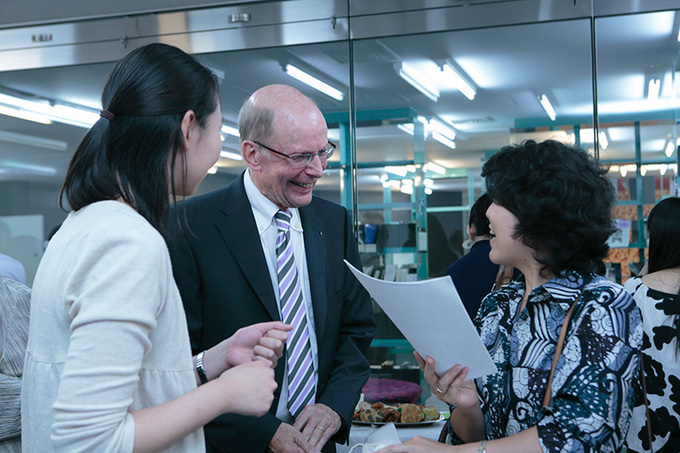
The lecturer Maaß having a conversation with the audience
(Photo: Atsuko Takagi)
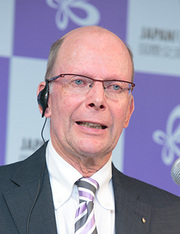 Kurt-Jürgen Maaß
Kurt-Jürgen Maaß
Kurt-Jürgen Maaß was born in 1943, and studied law in Hamburg, Lausanne, Speyer and Strasbourg, and obtained his Ph.D. from University of Hamburg. He previously worked in Brussels (NATO Parliamentary Assembly), Bonn (Alexander von Humboldt Foundation; German Ministry for Education and Science), Cologne (German Science Council), Stuttgart (Secretary General of the Institute for Foreign Cultural Relations) and Tübingen (Honorary Professor at the Institute for Political Science, University of Tübingen). His research subjects have been foreign cultural policy, European-Arabic dialogue, crisis prevention in foreign policy and foreign policy counseling.
1. Keith Dinnie (editor) Nation Branding. Concepts, Issues, Practice; Elsevier 2008 (30 authors)
2. Gilboa, Eytan: Searching for a Theory of Public Diplomacy The Annals of the American Academy of Political and Social Science, March 2008, no. 616: p. 59
3. Nicholas J. Cull, Public Diplomacy: Film as Public Diplomacy: The USIA's Cold War at Twenty-Four Frames per Second, S. 258in: Kenneth A. Osgood/Brian C. Etheridge (editors), The United States an Public Diplomacy, 2010, p. 257 - 284
4. Konzeption 2000, p. 1 (http://www.ifa.de/fileadmin/pdf/aa/akbp_konzeption2000.pdf)
5. Auswärtige Kultur- und Bildungspolitik Foreign cultural and educational policy in Zeiten der Globalisierung - Partner gewinnen, Werte vermitteln,
Interessen vertreten, September 2011, p. 5 (http://www.auswaertiges-amt.de/cae/servlet/contentblob/595030/publicationFile/161964/AKBP-Konzeption-2011.pdf)
6. Miriam Egger, Die Auslandsarbeit der politischen Stiftungen. Zwischen Entwicklungshilfe und Transformationskontext", 2007, p. 179
7. Miriam Egger l.c.p. 122 ff.
8. Yongnian Zheng und Chi Zhang, ‚Soft power' and Chinese soft power, S. 34, in: Hongyi Lai/Yiyi
Lu (Hg.), China's Soft Power and International Relations, 2012, p. 21 - 38
9. Ayhan Kaya/Ayse Tecmen: The Role of Yunus Emre Cultural Centres in Turkish Cultural; in: Topic, Martina / Rodin, Sinisa (editors), Cultural Diplomacy and Cultural Imperialism. European perspective(s); Frankfurt am Main, Berlin, Bern, Bruxelles, New York, Oxford, Wien, 2012. p. 95 - 116, hier: p. 97ff und 109. See also Erdmann/Herzog, Die Türkei in Afrika: Im Schatten des Neo-Osmanismus? In: GIGA Focus Nr. 1, 2012, p. 2
10. 16. Bericht der Bundesregierung zur Auswärtigen Kultur- und Bildungspolitik 2011/2012, p. 70 - 73; http://www.auswaertiges-amt.de/cae/servlet/contentblob/634528/publicationFile/175854/130109_16.pdf
Keywords
- Politics
- History
- NPO/NGO
- Peacebuilding
- Cultural Policy/Public Diplomacy
- Japan
- United States
- Greece
- Spain
- Germany
- France
- Portugal
- U.K.
- Saudi Arabia
- Syria
- Libya
- Soft power
- University of Tübingen
- Institut für Auslandsbeziehungen
- Diplomacy
- Cultural diplomacy
- Hamburg
- Birmingham
- World War II
- Hitler
- London
- Franco-German Youth Office
- Nazi
- Alexander von Humboldt Foundatio
- Stuttgart
- Islam
- Charles-Maurice de Talleyrand-Périgord
- Gustav Stresemann
- World War I
- Munich
- Deutsche Akademie
- Goethe-Institut
- Weltrundfunksender
- Deutsche Welle
- Weimar Republic
- 9.11
- Joseph Nye Jr.
- University of Southern California
- Nicholas J. Cull
- EU
- Miriam Egger
- Arab world
- Sunni
- Johann Wolfgang von Goethe
- Ludwig van Beethoven
- Pina Bausch
- Gerhard Richter
- Democracy
Back Issues
- 2019.8. 6 Unraveling the Maker…
- 2018.8.30 Japanese Photography…
- 2017.6.19 Speaking of Soseki 1…
- 2017.4.12 Singing the Twilight…
- 2016.11. 1 Poetry? In Postwar J…
- 2016.7.29 The New Generation o…
- 2016.4.14 Pondering "Revitaliz…
- 2016.1.25 The Style of East As…
- 2015.9.30 Anime as (Particular…
- 2015.9. 1 The Return of a Chin…


